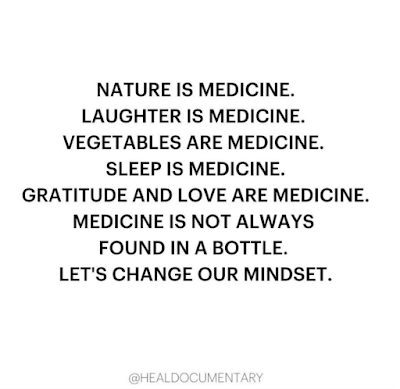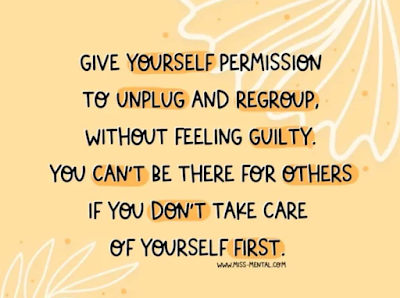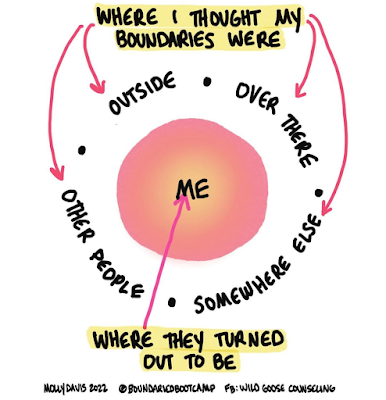No matter the differences regarding how each of us has been affected individually, I don't think it's a stretch to say that none of us will ever truly be the same.
I know I won't.
I am really big on gratitude and recognizing the inherent lessons in all experiences—both good and bad.
But let's face it: I think the general consensus is that—with all the suffering (mental and physical), shutdowns, supply-chain shortages, etc.—COVID bites the big one.
However.
I've learned A LOT about my relationships with others during these two years, and, most importantly, I've learned a hell of a lot about myself.
I just turned 45, and one would think I would have mastered these teachings long before the pandemic, but, nope.
Here's what I'll keep doing—even after the pandemic is long gone...
1. My health is of the upmost importance.
This isn't anything we didn't already know, right?
We know we should eat better; we know we should sleep more; we know we shouldn't sweat the small stuff.
We turn on the news, hear of a beloved celebrity's unexpected passing and vow to view that as a wake-up call.
But, then, normalcy resumes and...what was that about eating better, again?
Well, for me, everything "hit different," as the kids say, when COVID arrived on the scene.
While I had always placed a high priority on establishing healthy habits, I realized—while my kids were constantly underfoot during quarantine—that They. Were. Always. Watching. If I want them to know how important setting healthy habits are, I have to walk the walk.
2. I don't have to hold space of other's emotions.
I don't know of a person on this earth who hasn't been affected negatively by COVID.
Financial hardship and loneliness are just two burdens many have had to bear.
And many of us wish that we could just swoop in and alleviate the suffering of those around us.
But we can't always do that.
Because we're suffering, too.
Should we be compassionate? Yes.
Should we always remember to practice kindness—even when it isn't easy? YES!
But we can't pour from an empty cup.
Similarly, we can't hold it against others when they have too much on their plate to support us.
3. Being free doesn't necessarily mean available.
If I learned anything in these past 48 months it's that there is pleasure in doing absolutely nothing.
I think when everything got shutdown and life slowed to a crawl, this perception existed that because everyone was home, they were also free.
Wrong.
Additionally, there was a gross assumption that even asynchronous communication—i.e. texts and e-mails—should be answered at the drop of the hat.
Some didn't blink an eye at texting before the sun even came up or late into the night.
Others even thought coming over announced was okay because "of course you're ready for company! You're sitting at home, right!?"
Again: WRONG.
My time—as well as yours—is ours and ours alone.
The time we choose to give to others is a gift. Not an entitlement.
4. Life is better with boundaries.
If we had one buzzword in this house, it was this: Boundaries, boundaries, boundaries.
Until the pandemic, I never realized how much I lacked them...and how much I needed them.
In kindergarten, we learn to keep our hands and feet to ourselves, which are essential physical boundaries, no doubt.
But boundaries can also be emotional or mental, financial or material, spiritual or religious, and sexual.
And, make no mistake about it: Many will balk and squawk when we declare our boundaries and tell them no.
And we will receive pushback in return, which makes the process of setting boundaries uncomfortable at times.
But boundaries are still essential, nonetheless.
I've already begun instilling this mindset into my children. I tell them all the time that boundaries are a two-way street: We want others to respect our no, so we have to accept theirs as well...even when we'd rather not.
Choosing NOT to establish boundaries often leads to us to feeling angry and resentful—because that's what tends to happen when we do things out of obligation instead of desire—which, in the long run, can be far more detrimental than if we had just set the darn boundary in the first place.
In the words of one of my favorite authors, Nedra Glover Tawwab, "The root of self-care is setting boundaries. People don't know what you want. It's your job to make it clear. Clarity saves relationships."
5. Always follow your gut.
Oh, how I love this gem by Peaceful Barb (above).
And truer words have never been spoken.
In all my 45 years, I have yet to regret yielding to that inner voice or that pull from deep inside my gut.
They have steered me right each and every time.
And I've had to depend on them often during this pandemic.
Whether it was keeping my children enrolled in virtual learning while other parents chose to send their children back to school in person, or making the tough choice to abstain from hosting relatives at our home during the holidays, making these decisions wasn't a walk in the park.
Adding insult to injury was the fact that there weren't any roadmaps or cheat sheets.
No one had the 100% right answers.
Our family had to do what was right for us.
Our gut was our compass.
And as we learned firsthand, what we felt was right was not always popular.
© Copyright Courtney Conover, 2022








No comments:
Post a Comment